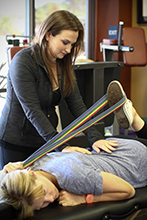Most adults know that annual hearing and vision screenings are important for children, but many underestimate how important they are for adults as well. As an adult, you probably get annual physical checkups, but you may hesitate to schedule annual hearing and vision screenings. Many people don’t think these screenings are important because they assume they will be able to tell if they have any problems with their hearing or vision.
If you’re the type of person who doesn’t like to go to the doctor unless it’s absolutely necessary, you probably haven’t received a hearing or vision screening in a long time. Here’s why that decision may be detrimental, and why you should start scheduling hearing and vision screenings consistently every year.
Understanding the Hearing Screening Process
A hearing screening is a system of tests or inquiries designed to identify those who may be at risk of a hearing impairment or disorder and may benefit from professional intervention. An estimated 15% of adults in the United States have some degree of hearing loss. The incidence of hearing loss increases in older individuals. Approximately 43% of adults over the age of 70 self-report that they have difficulty hearing. That number drops to 19% of adults ages 40-69, and 5.5% of adults ages 18-39.
Hearing loss in adults can contribute to a variety of other problems without intervention, including cognitive disorders, anxiety and depression. There is also a link between hearing loss and an increased risk of dementia. The good news is that routine hearing screenings may help reduce the likelihood of these issues and reduce the prevalence of undertreated hearing loss in adults.
Understanding the Vision Screening Process
Annual vision screenings are important for everyone. During a typical vision screening, the patient’s vision is tested and screenings are done to rule out problems such as cataracts, eye cancer and glaucoma. Many eye conditions cause minimal or no symptoms at all when they are in their early stages. A skilled eye doctor will be able to monitor the health of your eye and identify any early problems before they become more serious.
Annual vision screenings may even be able to reveal seemingly unrelated health problems such as high blood pressure and diabetes. So if you haven’t had your vision screened in over a year, it’s time to schedule that appointment!
Most eye exams include preliminary tests that evaluate your depth perception, eye muscle movements, peripheral vision and more. You’ll also be given a visual acuity test to determine how well each of your eyes can see. If necessary, you’ll be given an optical prescription to help you experience clearer eyesight.
Schedule Additional Screenings
In addition to your annual hearing and vision screenings, it’s also important to schedule regular physical examinations. These will help determine the state of your overall health. If you’re concerned about your health and would like to improve it, consider visiting Newport Medical and Wellness Center. You’ll find a variety of treatments and programs designed to help you look and feel your best, including preventative care, weight loss programs and other specialist services.












